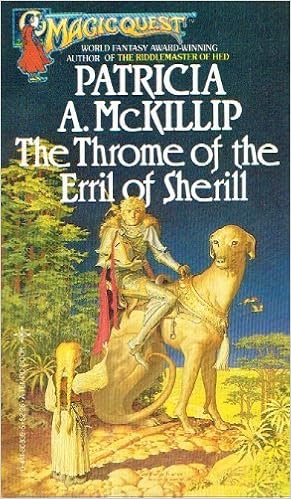 Edition: Tempo, 1984
Edition: Tempo, 1984Review number:1501
Unusual, poetic fantasy - the first Patricia A. McKillip which I have read, after many recommendations of her as a fantasy author.
This edition also includes The Harrowing of the Dragon of Hoarsbreath, and is still extremely short as books go: it could fairly easily be read in a single sitting. Of that short length, the title story makes up about two thirds. It is the story of a quest undertaken to win the hand of a King's daughter - the very hackneyed theme of fairy stories. The story is intended for a young adult audience, and could quite easily be read to or by children, though I think it is likely that they would miss a lot of what is really going on. To an adult well read in fantasy, it reads like a cross between Jack Vance and William Morris, with a playfulness with language which may be influenced by Jabberwocky or possibly comes more from Vance.
The language is perhaps the most obvious of The Throme of the Erril of Sherill's unusual qualities. Apart from the title of the story itself, there are made up words (a monstrous "borobel" could be straight from Lewis Carroll), and words which look almost right - perhaps versions from an alternate world where modern English developed slightly differently ("cnite" for knight, "Damsen" for the name of the princess - a damsel, and so on). This could be irritating, but I found it atmospheric.
But strange things also happen in the story itself. The cnite starts with the standard equipment of a knight - horse, sword, shield, armour - and as the quest goes on, he is forced to exchange these for magical items, the horse for a fire-breathing dog, and so on. The people he meets are rarely what you would expect on a quest - he does not slay monsters, rescue innocent maidens. At one point, there is an adventure which made me wonder if the whole story was not meant to be an allegory of aging and death.
The Harrowing of the Dragon of Hoarsbreath is apparently much more straightforward. A strange young man visits a strange island, where winter lasts twice as long as on the mainland, twenty miles away. He claims that this is due to a dragon, which he wishes to remove. This is an action with unforeseen consequences. Though told in a normal narrative form, it still seems that there is more to the story than is visible on the surface; the reader wants to invest it with a hidden meaning. For instance, is it about the unwisdom of making unwanted "improvements" to communities - doing away with tradition in the name of progress?
Altogether, two fascinating pieces of fantasy, well worth reading at any age. My rating: 9/10.



No comments:
Post a Comment